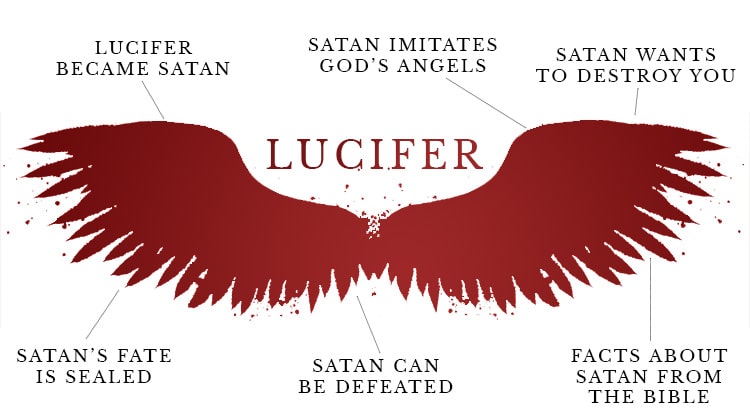When God created “the world and everything in it,” He created the angels (Acts 17:24; Psalm 104:4). These spiritual beings have unique roles and characteristics, but they share a common purpose. Their job is to worship God and minister to His people.
Lucifer was one of God’s angels—a magnificent being. The prophet Ezekiel described him as “the seal of perfection, full of wisdom and perfect in beauty…. Every precious stone was [his] covering…. [He was] the anointed cherub who covers…. [He was] perfect in [his] ways from the day [he was] created” (28:12-15). Lucifer was fully arrayed by the Creator to reflect His glory. This dazzling angel walked in the Garden of Eden and had direct access to God—until one day, when everything changed.
Lucifer Became Satan
Satan Wants to Destroy You
Satan Imitates God's Angels to Deceive You
Satan's Fate Is Sealed
Satan Can Be Defeated With Humility and Truth
Fast Facts About Satan From the Bible
Lucifer Became Satan
Lucifer’s splendor was his downfall. According to Ezekiel 28, he “became filled with violence within, and [he] sinned…. [His] heart was lifted up because of [his] beauty” (verses 16-17). Everything about Lucifer’s appearance was a gift from God, yet the gift inspired his rebellion. Here is what happened in Lucifer’s heart, according to Isaiah 14:12-14:
O Lucifer, son of the morning!
How you are cut down to the ground,
You who weakened the nations!
For you have said in your heart:
“I will ascend into heaven,
I will exalt my throne above the stars of God;
I will also sit on the mount of the congregation
On the farthest sides of the north;
I will ascend above the heights of the clouds,
I will be like the Most High.”
Proverbs 16:18 warns, “Pride goes before destruction, and a haughty spirit before a fall.” There is no clearer example than that of Lucifer. Not only did he want the adoration of his peers, but he also wanted to be God’s equal. Because of his pride, he fell from heaven’s glory, was sentenced to the pits of hell, and his name was changed to Satan.
When the Lord gives someone or something a name, it has meaning. The name Lucifer means “day star” or “son of the morning,” which aptly describes his intended role. His new name, Satan, means “adversary” because he became the enemy of God and all His people when he defied God. In the Bible, Satan is also called the king of Tyre, the devil, the Great Dragon, Beelzebub (meaning “lord of the flies”), the ruler of the demons, Belial (meaning “worthless” or “ruin”), the serpent, the ruler of this world, the father of lies, the evil one, and a roaring lion seeking someone to devour.

Satan Wants to Destroy You
In Isaiah 14, we see five statements Satan made that reveal his plan (verses 13-14, above). He wants to occupy God’s throne, exercise absolute authority over the angels, bring the universe under his rule, cover himself with the glory that belongs only to God, and be accountable to nobody but himself. With each statement, he tries to claim more of God’s glory for himself.
How well has his plan worked? Millions of people live in spiritual darkness because of him, and the Bible tells us that other angels followed him in rebellion. Revelation 12 describes him as a “great, fiery red dragon” whose tail swept one-third of the “stars of heaven” to earth (verses 3-4). These stars of heaven are the angels who followed his leadership rather than God’s. They are truly hell’s angels, and they work night and day to destroy mankind.
Satan Imitates God's Angels to Deceive You
In 2 Corinthians 11:14, the apostle Paul warns, “Satan himself transforms himself into an angel of light.” We need to remember that Satan and his demons were once holy angels who ministered in the presence of God. Far more than we, they know what faithful angels look like and act like, so they are skilled at counterfeiting the work of God’s servants.
Cartoons portray Satan as a red devil with horns, a pitchfork, and a tail. It would be helpful if he were so easy to spot, but that’s just not the way it is. When Mel Gibson produced The Passion of the Christ, he hired a beautiful woman to portray Satan. Then he altered her appearance by having her eyebrows shaved, and he shot the film so that she didn’t appear to blink. Why? In his words, “Evil is alluring, attractive. It looks almost normal, almost good—but not quite…. That’s what evil is about, taking something that’s good and twisting it a little bit.”1
The late Vance Havner once said, “If the devil were to come to town in a body, you wouldn’t find him in a nightclub or in a gambling hall…. You would more likely find him in a pulpit with a D.D. degree, drawing a salary for denying his own existence.” Satan’s tactics haven’t changed. He is still a liar. That’s why 1 John 4:1 instructs us to “test the spirits, whether they are of God; because many false prophets have gone out into the world.” We must be vigilant so that we will not fall into his snares.

Satan's Fate Is Sealed
In Ezekiel 28:16-19, God describes Lucifer’s fate.
Out of the mountain of God;
And I destroyed you, O covering cherub,
From the midst of the fiery stones.
Your heart was lifted up because of your beauty;
You corrupted your wisdom for the sake of your splendor;
I cast you to the ground,
I laid you before kings,
That they might gaze at you.
You defiled your sanctuaries
By the multitude of your iniquities,
By the iniquity of your trading;
Therefore I brought fire from your midst;
It devoured you,
And I turned you to ashes upon the earth
In the sight of all who saw you.
All who knew you among the peoples are astonished at you;
You have become a horror,
And shall be no more forever.
Sin must be punished. Galatians 6:7 says, “Do not be deceived, God is not mocked; for whatever a man sows, that he will also reap.” When we compare God’s judgment to Lucifer’s “I will” declarations, we see that the punishment matches the offense.
- Satan was cast out of heaven, rather than rising to the highest realms.
- He was cast to the ground, rather than being exalted “above the stars of God” or ascending “above the heights of the clouds.”
- He was “laid before kings,” rather than sitting “on the mount of the congregation.”
- He was turned to ashes, rather than reigning in the place of the Most High.
Even though he had witnessed the beauty and perfection of heaven, Lucifer decided it wasn’t enough for him. He wanted to rule in God’s place. That’s one reason he deceives people—he yearns to rule over us. But he has another motive. He knows his fate is sealed. One day he will spend eternity in hell. In the meantime, he wants to take as many people to hell as he can.
How could a holy angel fall into sin? God created him in the same way He created us—with the freedom to choose obedience or rebellion. He does not create robots. The difference is that His grace, which is available to us through the death and resurrection of Jesus Christ, does not extend to Lucifer and his demons.

Satan Can Be Defeated With Humility and Truth
Pride was Lucifer’s downfall. He thought he deserved to be like God, and he tempted Eve with the same idea. “In the day you eat of [the tree] your eyes will be opened, and you will be like God, knowing good and evil” (Genesis 3:5). If pride had the power to lure Lucifer and Eve, it has the power to lure us.
The first step is to decide whom we will serve. Will we serve a prideful, fallen angel or a gentle Savior? The answer seems obvious, but every time we puff up with pride, we gratify the angel. We may not reach for forbidden fruit, but we stumble in other ways. Maybe we criticize someone else’s shortcomings, or we accept credit for God’s handiwork, or we neglect Bible study and prayer. Following the Lord is not a one-time decision. After the initial act of faith, it is a series of decisions throughout life that draw us closer to Him or pull us away from Him.
This is a battle we will fight for our entire life. Envy and pride want to get in and separate us from our fellow believers, but we can overcome temptation by choosing humility. Romans 12:16 says, “Do not set your mind on high things, but associate with the humble. Do not be wise in your own opinion.” Jesus associated with all sorts of people and served their needs. “Whoever desires to be first among you, let him be your slave—just as the Son of Man did not come to be served, but to serve, and to give His life a ransom for many” (Matthew 20:27-28).
In addition to being humble, knowing the Word of God will help us defeat our adversary. Jesus said, “You shall know the truth, and the truth shall make you free” (John 8:32). This statement applies to everyone, but it does not apply to all truth. It applies to God’s truth. In John 14, Jesus told Thomas, “I am the way, the truth, and the life. No one comes to the Father except through Me” (verse 6). Knowing the truth is one of our best defenses against Satan’s attacks.
In John 17, Jesus prayed for His disciples and all believers, asking God to “Sanctify them by Your truth, Your word is truth” (verse 17). As God’s children, we participate in His sanctifying activity by resisting Satan and living out the truth found in His Word, and that prepares us for sharing the truth with others.

Fast Facts About Satan From the Bible
Do not let Satan deceive you. If you are God’s child, he holds no power over you. To get started in your quest for truth, consider these facts about your adversary—straight from God’s Word.
Isaiah 14:12-14
How you are fallen from heaven, O Lucifer, son of the morning! How you are cut down to the ground, you who weakened the nations! For you have said in your heart: "I will ascend into heaven, I will exalt my throne above the stars of God; I will also sit on the mount of the congregation on the farthest sides of the north; I will ascend above the heights of the clouds, I will be like the Most High."
Ezekiel 28:11-16
The word of the Lord came to me, saying, "Son of man, take up a lamentation for the king of Tyre, and say to him… You were the anointed cherub who covers; I established you; you were on the holy mountain of God…. You were perfect in your ways from the day you were created, till iniquity was found in you…. you became filled with violence within, and you sinned."
Luke 10:17-19
Then the seventy returned with joy, saying, "Lord, even the demons are subject to us in Your name." And He said to them, "I saw Satan fall like lightning from heaven. Behold, I give you the authority to trample on serpents and scorpions, and over all the power of the enemy, and nothing shall by any means hurt you."
2 Corinthians 11:14
Satan himself transforms himself into an angel of light.
1 Peter 5:8-9
Be sober, be vigilant; because your adversary the devil walks about like a roaring lion, seeking whom he may devour. Resist him, steadfast in the faith, knowing that the same sufferings are experienced by your brotherhood in the world.
Revelation 12:7-9
And war broke out in heaven: Michael and his angels fought with the dragon; and the dragon and his angels fought, but they did not prevail, nor was a place found for them in heaven any longer. So the great dragon was cast out, that serpent of old, called the Devil and Satan, who deceives the whole world; he was cast to the earth, and his angels were cast out with him.
There is a powerful hymn by Keith and Kristyn Getty that says, “No pow’r of hell, no scheme of man, can ever pluck me from His hand; till He returns or calls me home—here in the pow’r of Christ I’ll stand.”2 Satan is a formidable enemy who is hellbent on destroying us, but He is no match for God who is our strength. When we stand on the firm foundation of God’s truth, we can overcome our enemy’s schemes.
Sources:
1 Mark Moring, “What’s Up With the Ugly Baby?” Christianity Today, March 1, 2004, https://www.christianitytoday.com/ct/2004/marchweb-only/040301passion.html, accessed on August 8, 2019.
2Keith Getty and Stuart Townend, “In Christ Alone,” Thankyou Music(PRS) ADM Worldwide, 2002.
